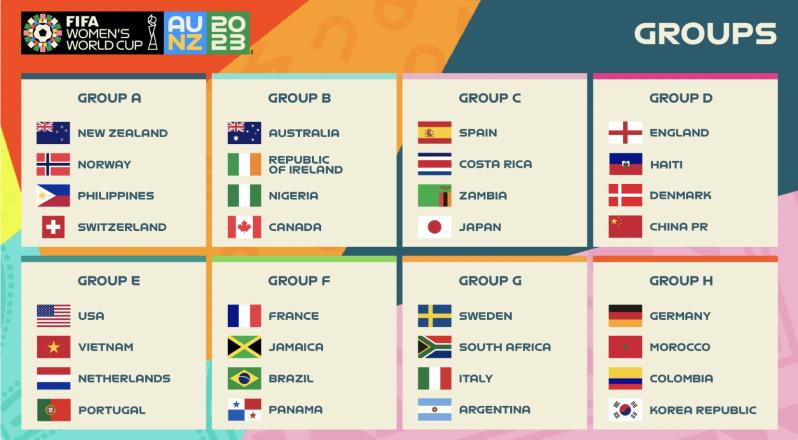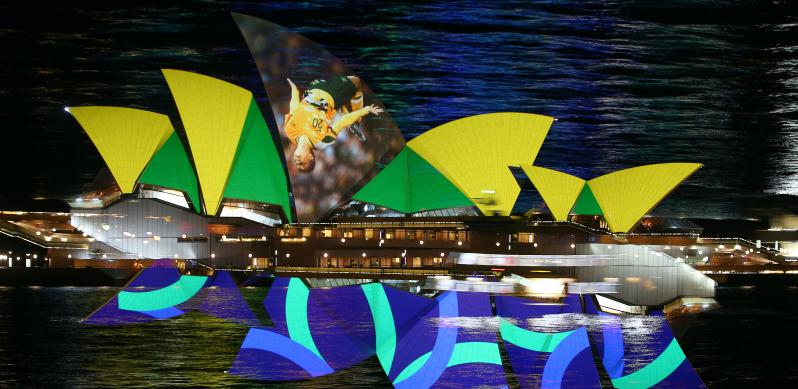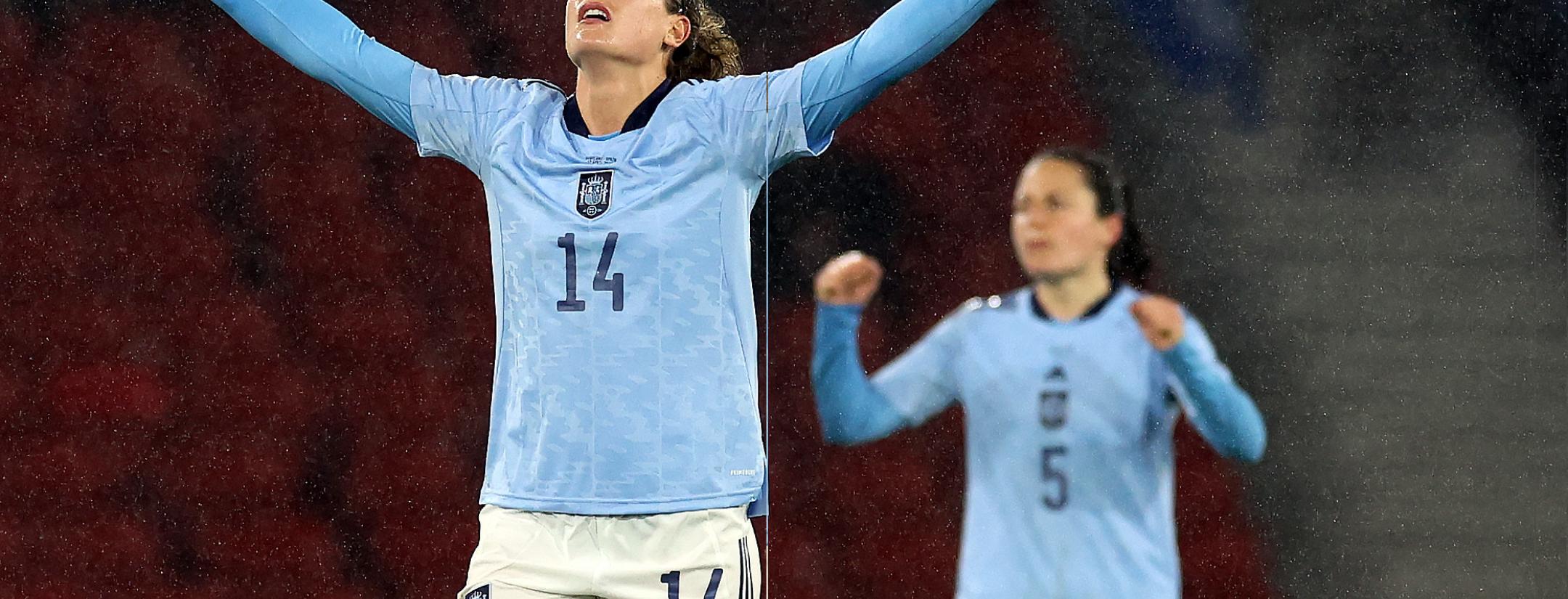The 2023 Women’s World Cup is quickly approaching. Co-hosted by Australia and New Zealand, the tournament will feature 32 teams for the first time, eight more than the previous high. Let’s take a closer look at what countries qualified for the Women's World Cup.
The 2023 Women’s World Cup will be the first FIFA tournament (men’s or women’s) hosted by nations from two different confederations and the second World Cup to be co-hosted after the 2002 men’s World Cup in Japan and South Korea. Australia belongs to the Asian Football Confederation while New Zealand is a member of the Oceania Football Confederation. Australia left the OFC for the AFC in 2006.
The Women’s World Cup has steadily increased the number of teams participating, growing from 12 in 1991 and 1995 to 16 from 1999 to 2011 and 24 teams the last two editions. More teams than ever had a chance to reach the Women’s World Cup, making this qualifying campaign the most fascinating yet.
Qualifying for the 2023 Women’s World Cup began in September 2021 and ran all the way to February 2023, four months before the tournament. Australia and New Zealand were given automatic berths as co-hosts, leaving 30 spots up for grabs.
Here is a list showing what countries qualified for the Women's World Cup. Below we’ll explain the qualifying processes for each confederation.
What Countries Have Qualified For The Women's World Cup 2023?
- Australia
- New Zealand
- Japan
- South Korea
- China
- Philippines
- Vietnam
- Sweden
- Spain
- France
- Denmark
- United States
- Canada
- Costa Rica
- Jamaica
- Zambia
- Morocco
- Nigeria
- South Africa
- Colombia
- Brazil
- Argentina
- Norway
- Germany
- England
- Italy
- Netherlands
- Ireland
- Switzerland
- Haiti
- Portugal
- Panama

Here’s how the 32 World Cup berths were divided by confederation. FIFA created a 10-team playoff for the final three berths, with matches played Feb. 17-23, 2023, in New Zealand and Australia.
2023 Women’s World Cup Berths By Confederation
AFC (Asia)
Direct Berths: 5+1
Playoff Spots: 2
Nations Competing: 27
CAF (Africa)
Direct Berths: 4
Playoff Spots: 2
Nations Competing: 32
Concacaf (North, Central America, Caribbean)
Direct Berths: 4
Playoff Spots: 2
Nations Competing: 32
CONMEBOL (South America)
Direct Berths: 3
Playoff Spots: 2
Nations Competing: 10
OFC (Oceania)
Direct Berths: 0+1
Playoff Spots: 1
Nations Competing: 10
UEFA (Europe)
Direct Berths: 11
Playoff Spots: 1
Nations Competing: 51
Intercontinental Playoffs
Direct Berths: 3
Nations Competing: 10

Keep reading for a guide on what countries have qualified for the Women's World Cup 2023. Photo: Getty Images
Now we’ll look at how each confederation conducted qualifying before explaining the inter-confederation playoffs.
What Countries Have Qualified For The Women's World Cup By Confederation?
AFC (Asia)
Qualified (6 total): Australia (automatic bid), China, South Korea, Japan, Philippines, Vietnam
In Playoffs (2): Chinese Taipei, Thailand
Asian World Cup qualifying played out during the AFC Women’s Asian Cup 2022 from Jan. 20-Feb. 6, 2022. With five Women’s World Cup berths to give out, the top five finishers in the tournament received berths. For the top four teams, this was as simple as the four semifinalists: China, Japan, South Korea and the Philippines, the latter of which qualified for its first-ever World Cup, men’s or women’s.
After that, the four remaining quarterfinalists were in the running for the fifth berth. Because Australia was knocked out in the quarterfinals and already qualified as host, the other three quarterfinalists — Vietnam, Thailand and Chinese Taipei — played a round-robin group stage. Vietnam won to qualify for its first Women’s World Cup. Thailand and Chinese Taipei advanced to the intercontinental playoffs.
CAF (Africa)
Qualified (4): Zambia, Morocco, Nigeria, South Africa
In Playoffs (2): Senegal, Cameroon
The 2022 Africa Women Cup of Nations from July 2-23 in Morocco determined the Women’s World Cup entrants from Africa.
The 12 qualified teams competed for four direct berths to the 2023 WWC (the semifinalists), while two more earned places in the intercontinental playoffs.
Concacaf (North, Central America, Caribbean)
Qualified (4): United States, Costa Rica, Canada, Jamaica
In Playoffs (2): Haiti, Panama
The Concacaf W Championship scheduled for July 4-18, 2022, in Monterrey, Mexico, served as qualifying for the 2023 Women’s World Cup. Eight teams divided in to two groups, with the top two teams advancing to the semifinals and qualifying for the Women’s World Cup. The two third-place finishers earned a place in the intercontinental playoffs.
Additionally, the winner of the Concacaf W Championship (the U.S.) qualified for the 2024 Olympics. The second- and third-place finishers (Canada and Jamaica) will play in a Concacaf Olympic playoff in September 2023 to determine Concacaf’s second Olympic qualifier.
The two-time reigning champion USWNT qualified for the World Cup after two matches at the tournament, joined by Canada, Jamaica and Costa Rica at the World Cup. Haiti and Panama advanced to the intercontinental playoff. Mexico missed out on a second straight World Cup.
Step One: ☑️
WE’VE QUALIFIED FOR THE 2023 @FIFAWWC!!!! pic.twitter.com/jUSgovQcrx
— U.S. Soccer WNT (@USWNT) July 8, 2022
CONMEBOL (South America)
Qualified (3): Colombia, Brazil, Argentina
In Playoffs (2): Chile, Paraguay
The 2022 Copa América Femenina served as Women’s World Cup qualifying for CONMEBOL. The tournament was played in Colombia from July 8-30, 2022.
The 10 nations divided into two groups of five, with the top two in each group advancing to semifinals and the two third-place teams advancing to a fifth-place playoff for one of the two berths into the intercontinental playoffs. The two teams that reached the final (Brazil, Colombia) received a direct berth to the WWC in addition to the nation that won the third-place match (Argentina). The loser of the third-place match (Paraguay) qualified for the inter-confederation playoffs.
OFC (Oceania)
Qualified (1): New Zealand (automatic)
In Playoffs (1): Papua New Guinea
The 2022 OFC Women’s Nations Cup will determine OFC’s singular qualifying berth, a place in the intercontinental playoffs. The tournament will be played in Fiji from July 13-30, 2022.
The winner of the 10-team tournament (Papua New Guinea) received a place in the playoffs. Defending champion New Zealand did not compete in the tournament as it qualified as co-host.
UEFA (Europe)
Qualified (11): Sweden, Spain, France, Denmark, Norway, Germany, England, Italy, Netherlands, Switzerland, Ireland
In Intercontinental Playoffs (1): Portugal
UEFA is the only confederation to hold an actual qualifying campaign for the World Cup, like most confederations do for the men, as opposed to using a tournament to decide the qualifiers. The 51 nations competing were divided into nine groups of five or six. The winners of each group qualify directly for the World Cup.
Sweden, Spain and France were the first to clinch first place in their groups and a trip to Australia/New Zealand.
What a night in Europe! Three more places have been secured at the #FIFAWWC 2023!
Congratulations to @SvenskFotboll, @SeFutbolFem and @EquipedefranceF! pic.twitter.com/XDInH0jt4d
— FIFA Women's World Cup (@FIFAWWC) April 12, 2022
The nine second-place finishers in the group stage advance to a UEFA playoff to determine the final two direct berths to the World Cup, plus a final place in the intercontinental playoff. In the UEFA playoff, Switzerland and Ireland qualified for the tournament while Portugal took the intercontinental playoff spot.
In February 2022, FIFA suspended Russia for the country’s invasion of Ukraine and disqualified the women’s national team from the 2022 Euros and 2023 Women’s World Cup.
Intercontinental Playoffs
Qualified (3): Haiti, Portugal, Panama
In Playoffs (10): Chinese Taipei, Thailand, Haiti, Panama, Senegal, Cameroon, Chile, Paraguay, Papua New Guinea, Portugal
The intercontinental playoffs provided an entertaining build-up to the 2023 Women’s World Cup with 10 teams competing from six confederations. Australia and New Zealand hosted the matches from Feb. 17-23, 2023.
The 10 teams were seeded based on FIFA ranking, with a maximum of one seeded team per confederation. Group 1 and Group 2 consisted of three teams while Group 3 included four teams. The top two seeded teams went into Groups 1 and 2 and received a bye in the first round while the third and fourth seeded teams in Group 3 faced unseeded teams in the first round. The winners of the three groups qualified for the Women’s World Cup.
Additionally, the losers of the first-round matches in Group 1 and 2 played friendlies against Australia and New Zealand while there was a third-place friendly in Group 3 to ensure all participating teams played two matches.
We knew exactly what countries had qualified for the Women's World Cup at the end of the intercontinental playoffs on Feb. 23. The Women’s World Cup draw divided the 32 teams into four groups of eight, with the top two teams in each group advancing to single-elimination knockout rounds until a champion is declared.
Matches will be played in six stadiums across five cities in Australia and four cities and venues in New Zealand. The final will be played on Aug. 20, 2023, at Stadium Australia in Sydney.




